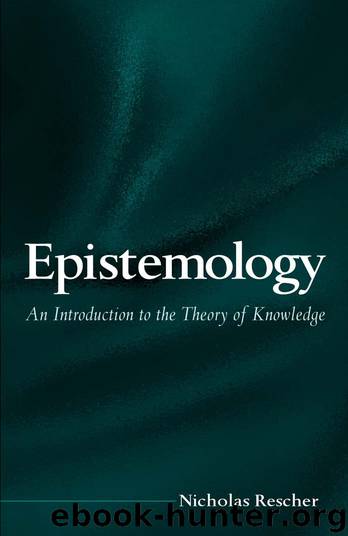Epistemology : An Introduction by Nicholas Rescher

Author:Nicholas Rescher [Rescher, Nicholas]
Language: eng
Format: epub
Published: 2011-02-17T05:00:00+00:00
Rationality
205
The only sort of justification of anything—rationality included—that is worth having at all is a rational one. That presupposition of rationality is not vitiating, not viciously circular, but essential—an unavoidable consequence of the self-sufficiency of cognitive reason. There is simply no satisfactory alternative to using reason in its own defense. Already embarked on the sea of rationality, we want such assurance as can now be made available that we have done the right thing.
And such reassurance can indeed be given—exactly along the lines just indicated. Given the very nature of the justificatory enterprise at issue, one just cannot avoid letting rationality sit in judgment on itself. (What is being asked for, after all, is a rational argument for rational action, a basis for rational conviction, and not persuasion by something probatively irrelevant like threats of force ma-jeure.) One would expect, nay demand, that rationality be self-substantiating in this way—that it must emerge as the best policy on its own telling.
From the justificatory point of view, rationality is and must be autonomous. It can be subject to no external authority. Rationality in general is a matter of systematization, and the justification of rationality is correspondingly a matter of systemic self-sufficiency. Rather than indicating the defect of vicious circularity, the self-referential character of a justification of rationality is a precondition of its adequacy! It is only a rational legitimation of rationality that we would want: any other sort would avail us nothing. And if such a rational validation were not forthcoming this would indicate a grave defect.
And so, the predicament of reason gives no comfort to skepticism or irrationalism, and yields no grounds for abandoning reason or, worse yet, for turning against it. Admittedly, this self-supportive legitimation of rationality is the only cogent sort of validation that we are going to get. But in the final analysis it is the only sort that it makes sense to ask for, seeing that rationality itself enjoins us to view the best we can possibly get as good enough.11
A desperate objection yet remains: “So rationality speaks on its own behalf.
Well and good. But why should I care for rationality? Why should I set myself to do the intelligent and appropriate thing?”
At this point there is little more to be said. If I want a reason at all, I must want a rational reason. If I care about reasons at all, I am already within the project of rationality. But once I am within the project, there is nothing further external to reason that can or need be said to validate it. At that stage rationality is already at hand to provide its own support—it wears its justification on its sleeve. (The project of trying to reason with someone who stands outside the range of rationality to convince them to come into its fold is clearly an exercise in pointlessness and futility.)
One may of course quite appropriately ask questions like: Why should I cultivate the truth; why should I cultivate my best (or true) interests? But
Download
This site does not store any files on its server. We only index and link to content provided by other sites. Please contact the content providers to delete copyright contents if any and email us, we'll remove relevant links or contents immediately.
| Anthropology | Archaeology |
| Philosophy | Politics & Government |
| Social Sciences | Sociology |
| Women's Studies |
The remains of the day by Kazuo Ishiguro(9000)
Tools of Titans by Timothy Ferriss(8396)
Giovanni's Room by James Baldwin(7347)
The Black Swan by Nassim Nicholas Taleb(7130)
Inner Engineering: A Yogi's Guide to Joy by Sadhguru(6796)
The Way of Zen by Alan W. Watts(6614)
The Power of Now: A Guide to Spiritual Enlightenment by Eckhart Tolle(5784)
Asking the Right Questions: A Guide to Critical Thinking by M. Neil Browne & Stuart M. Keeley(5775)
The Six Wives Of Henry VIII (WOMEN IN HISTORY) by Fraser Antonia(5515)
Astrophysics for People in a Hurry by Neil DeGrasse Tyson(5190)
Housekeeping by Marilynne Robinson(4449)
12 Rules for Life by Jordan B. Peterson(4305)
Ikigai by Héctor García & Francesc Miralles(4275)
Double Down (Diary of a Wimpy Kid Book 11) by Jeff Kinney(4273)
The Ethical Slut by Janet W. Hardy(4256)
Skin in the Game by Nassim Nicholas Taleb(4250)
The Art of Happiness by The Dalai Lama(4130)
Skin in the Game: Hidden Asymmetries in Daily Life by Nassim Nicholas Taleb(4007)
Walking by Henry David Thoreau(3963)
